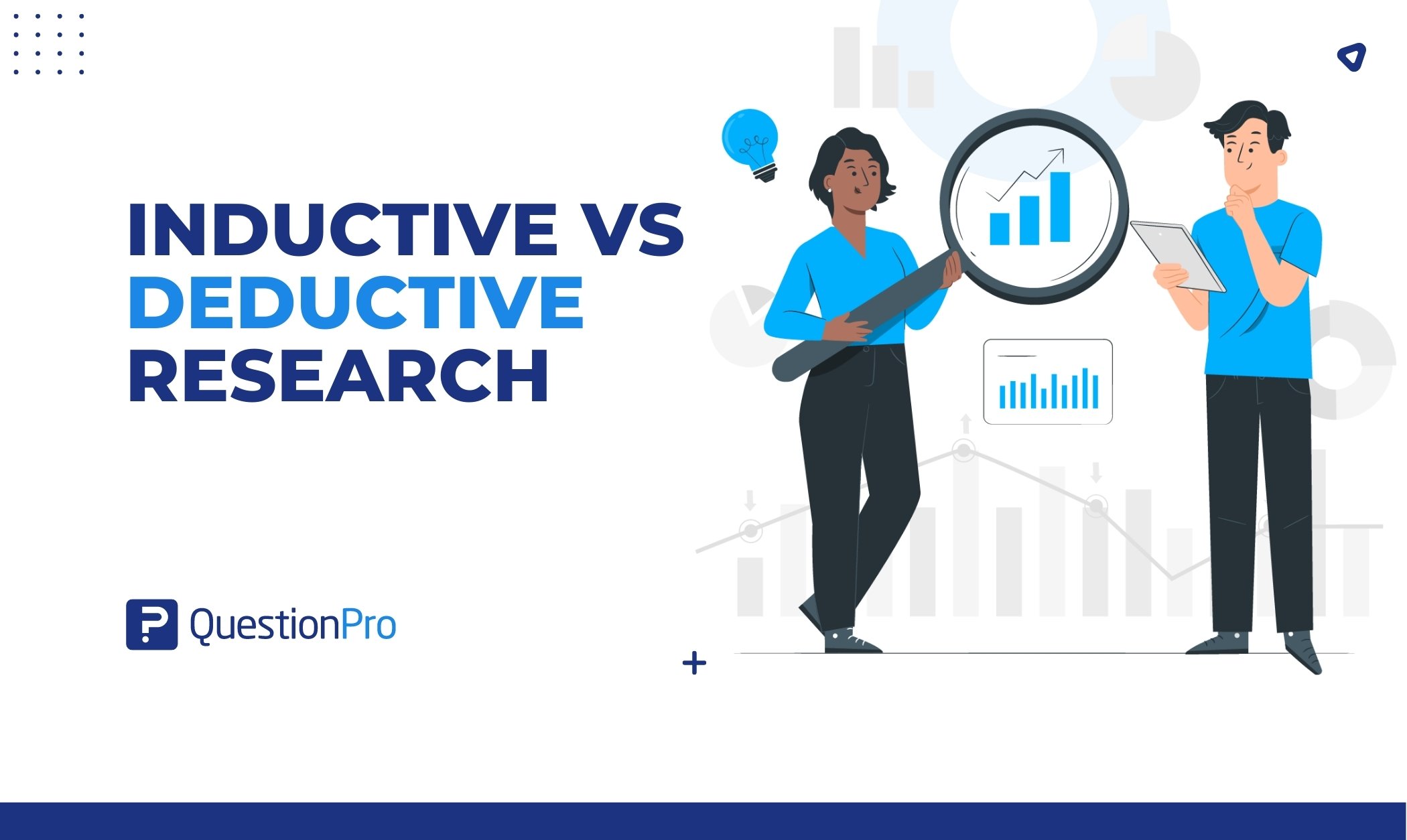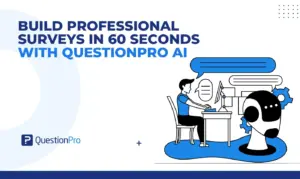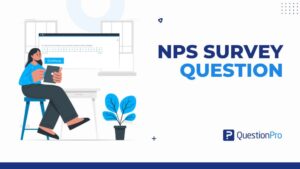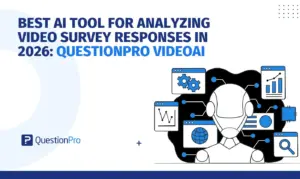
The terms “inductive” and “deductive” are often used in logic, reasoning, and science. Scientists use both inductive and deductive research methods as part of the scientific method.
Famous fictional detectives like Sherlock Holmes are often associated with deduction, even though that’s not always what Holmes does (more on that later). Some writing classes include both inductive and deductive essays.
But what’s the difference between inductive vs deductive research? The difference often lies in whether the argument proceeds from the general to the specific or the specific to the general.
Both methods are used in different types of research, and it’s not unusual to use both in one project. In this article, we’ll describe each in simple yet defined terms.
Content Index:
- What is inductive research?
- Stages of inductive research process
- What is deductive research?
- Stages of deductive research process
- Difference between inductive vs deductive research
- Conclusion
What is inductive research?
Inductive research is a method in which the researcher collects and analyzes data to develop theories, concepts, or hypotheses based on patterns and observations seen in the data.
It uses a “bottom-up” method in which the researcher starts with specific observations and then moves on to more general theories or ideas. Inductive research is often used in exploratory studies or when not much research has been done on a topic before.
LEARN ABOUT: Research Process Steps
Stages of inductive research process
The three steps of the inductive research process are:
- Observation:
The first step of inductive research is to make detailed observations of the studied phenomenon. This can be done in many ways, such as through surveys, interviews, or direct observation.
- Pattern Recognition:
The next step is to look at the data in detail once the data has been collected. This means looking at the data for patterns, themes, and relationships. The goal is to find insights and trends that can be used to make the first categories and ideas.
- Theory Development:
At this stage, the researcher will start to create initial categories or concepts based on the patterns and themes from the data analysis. This means putting the data into groups based on their similarities and differences to make a framework for understanding the thing being studied.
LEARN ABOUT: Data Management Framework
These three steps are often repeated in a cycle, so the researcher can improve their analysis and understand the phenomenon over time. Inductive research aims to develop new theories and ideas based on the data rather than testing existing theories, as in deductive research.
What is deductive research?
Deductive research is a type of research in which the researcher starts with a theory, hypothesis, or generalization and then tests it through observations and data collection.
It uses a top-down method in which the researcher starts with a general idea and then tests it through specific observations. Deductive research is often used to confirm a theory or test a well-known hypothesis.
Stages of deductive research process
The five steps in the process of deductive research are:
- Formulation of a hypothesis:
The first step in deductive research is to develop a hypothesis and guess how the variables are related. Most of the time, the hypothesis is built on theories or research that have already been done.
- Design of a research study:
The next step is designing a research study to test the hypothesis. This means choosing a research method, figuring out what needs to be measured, and figuring out how to collect and look at the data.
- Collecting data:
Once the research design is set, different methods, such as surveys, experiments, or observational studies, are used to gather data. Usually, a standard protocol is used to collect the data to ensure it is correct and consistent.
- Analysis of data:
In this step, the collected data are looked at to see if they support or disprove the hypothesis. The goal is to see if the data supports or refutes the hypothesis. You need to use statistical methods to find patterns and links between the variables to do this.
- Drawing conclusions:
The last step is drawing conclusions from the analysis of the data. If the hypothesis is supported, it can be used to make generalizations about the population being studied. If the hypothesis is wrong, the researcher may need to develop a new one and start the process again.
The five steps of deductive research are repeated, and researchers may need to return to earlier steps if they find new information or new ways of looking at things. In contrast to inductive research, deductive research aims to test theories or hypotheses that have already been made.
Difference between inductive vs deductive research
The main differences between inductive and deductive research are how the research is done, the goal, and how the data is analyzed. Inductive research is exploratory, flexible, and based on qualitative observation analysis. Deductive research, on the other hand, is about proving something and is structured and based on quantitative analysis.
Here are the main differences between inductive vs deductive research in more detail:
| Topics | Inductive research | Topics | Deductive research |
| Bottom-upapproach | In inductive research, the researcher starts with data and observations, then uses data patterns to develop theories or generalizations. This is a bottom-up approach in which the researcher builds from specific observations to more general theories. | Top-down approach | In deductive research researcher starts with a theory or hypothesis, then tests it through observations and gathering data. This is a top-down approach in which the researcher tests a theory or generalization using specific observations. |
| Develops theories from observations | In inductive research, theories or generalizations are made based on what has been seen and how it has been seen. The goal is to create theories explaining and making sense of the data. | Tests theories through observations | Deductive research aims to use real-world observations to test theories or hypotheses. The person doing the research gathers data to prove or disprove the theory or hypothesis. |
| Used in exploratory studies | Inductive research is often used to learn more about a phenomenon or area of interest when there is a limited amount of previous research on the subject. With this method, new theories and ideas can be made from the data. | Used in confirmatory studies | Researchers often use deductive research when they want to test a well-known theory or hypothesis and either prove or disprove it. This method works best when the researcher has a clear research question and wants to test a specific hypothesis. |
| Flexible and adaptable to new findings | Inductive research is flexible and open to new information because researchers can change their theories and hypotheses based on their findings. This method works best when the research question is unclear, or unexpected results arise. | Structured and systematic | Deductive research is structured and methodical because it uses a research design and method that have already been decided upon. This method starts with a clear plan for the research, making it easier to collect and analyze data more objectively and consistently. |
| Relies more on qualitative analysis | Inductive research uses more qualitative analysis, like textual or visual analysis, to find patterns and themes in the data. | Relies more on quantitative analysis | Deductive research uses more quantitative methods, like statistical analysis, to test and confirm the theory or hypothesis. This method uses numbers to test the theory or hypothesis and draw objective conclusions. |
LEARN ABOUT: Theoretical Research
Conclusion
Inductive research and deductive research are two different types of research with different starting points, goals, methods, and ways of looking at the data.
Inductive research uses specific observations and patterns to come up with new theories. On the other hand, deductive research starts with a theory or hypothesis and tests it through observations.
Both approaches have advantages as well as disadvantages and can be used in different types of research depending on the question and goals.
QuestionPro is a responsive online platform for surveys and research that can be used for both inductive and deductive research. It has many tools and features to help you collect and analyze data, such as customizable survey templates, advanced survey logic, and real-time reporting.
With QuestionPro, researchers can do surveys, send them out, analyze the results, and draw conclusions that help them make decisions and learn more about their fields.
The platform has advanced data analysis and reporting tools that can be used with both qualitative and quantitative methods of data analysis.
Whether researchers do inductive or deductive research, QuestionPro can help them design, run, and analyze their projects completely and powerfully. So sign up now for a free trial!







